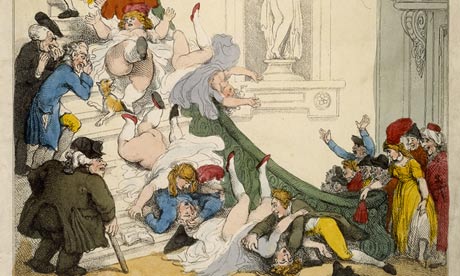 |
| The Pink Sugar on display inside the Hofburg Palace
By Frederic Morton, DaCapo Press, 2001
This is a companion volume to Morton's A Nervous Splendor: Vienna 1888/1889 and rounds out his history of the Austro-Hungarian empire. His histories are compulsively readable and very enjoyable. Sweeping, synthetic overviews like this are a good first step in learning about the past.
|
A diary devoted to reading the 100 novels cited in Jane Smiley's 13 Ways of Looking at the Novel
Monday, December 9, 2013
Thunder at Twilight: Vienna 1913/1914
Gulliver's Travels
 |
| In the country of the Houyhnhnms
By Jonathan Swift, WW Norton and Co., 2002
I haven't read this story in over twenty-five years. A sharp satire and surprisingly physical. There is, in terms that I connect with my new puppy, wee and poo everywhere.
|
Nightmare Abby, Crotchet Castle
 |
| Thomas Love Peacock in later life
By Thomas Love Peacock, New York, Penguin Books, 1986
I love satire and I love the Romantic British poets, so how could I fail to revel in these gems by Thomas Love Peacock? He was good friends with Shelley and these novels are send-ups of Regency intellectual trends and cultural fads. So far, so good, but I felt excluded. I dutifully read all the textual notes that explain the various debates to the reader, yet I only felt a distant type of bemusement. Not only is there Latin but plenty of Greek too! This is a story about men for men. I was reminded of the plays by Sheridan in the humor: characters sport names that indicate their personality or opinions (e.g., the Reverend Mr. Larynx, the Honourable Mr. Listless). I'll try rereading this in the future. |
The Expedition of Humphry Clinker
 |
| Thomas Rowlandson, The Exhibition Staircase, ca. 1811
By Tobias Smollett, Oxford, Oxford University Press, 2009
My favorite 18th century novel. Its a travelogue and the funniest book in the English language.
|
Robinson Crusoe
 |
| Francis Cotes, Edward Knowles, c. 1740
By Daniel Defoe, New York, The Modern Library, 2001
I really can't believe this is the same author that wrote Roxana and Moll Flanders. Defoe's tone is sympathetic and humane here. When Robinson Crusoe is marooned on the island, he behaves like an industrious, pragmatic member of the middle class and slowly recreates his world. He builds shelter, hunts for food, domesticates animals, builds a ship, etc. A very interesting comment on gender, class, empire and race. What startled me is how this is a Protestant tale par execellence. |
The Female Quixote
 |
| Allan Ramsay, Jean Abercomby, Mrs. Morison of Haddo, c.1767
Charlotte Lennox, Oxford, Oxford University Press, 1997
Arabella reads French novels and decides to act as a heroine in the drama of her own life. She lives her life according to the manners and values of romances, and this makes her unfit for 18th century society. A charming, funny book. Jane Austen read this novel twice. |
Subscribe to:
Posts (Atom)